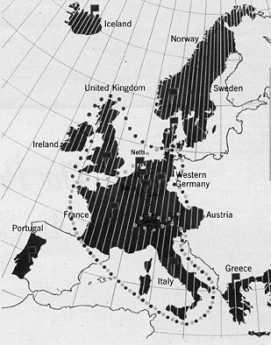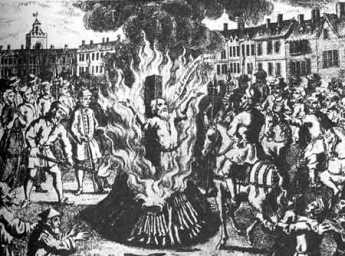Related Topics
No topics are associated with this blog
Why Do Nation States Repeatedly Unite and Dis-Unite?
Big nations easily gobble up small ones, so small ones band together. As George Washington famously observed, when you are strong the others will leave you alone. Other circumstances sometimes make smallness seem attractive, especially if the nation is already uniform in religion, language, and culture -- until a bigger aggressor begins to growl. Most nations then discover that survival comes first. Both the American Revolution of 1776 and present struggles of the European Union fit a common formula: banding together for military security, then later pulling back for greater independence. The American experience of a Civil War eighty years later suggests the margin for error is narrow.

|
| Europe |
Geography doubtless imposes limits for both peace and prosperity. Some nations have therefore banded together for military reasons then split apart in local quarrels, more or less regularly. The thirteen American colonies had been afraid to confront Britannia alone, but somewhat overconfidently took on that challenge as a confederation of thirteen. We began by talking about Taxation Without Representation. but ended eight years of warfare united for Independence. This conversion was hastened after lawyers explained it meant the difference between negotiating a treaty for Peace and being hanged for a rebellion. At the other extreme, little Rhode Island even refused to send delegates to the Constitutional Convention, for fear the other twelve would want to share its toll revenues from the coastal road. Similar possessiveness has not yet been reported about the narrow defile through the northern end of the even smaller State of Delaware. At least they are not morally superior in Delaware, which for decades protected its secrets of mushroom cultivation. Everyone wants Peace and Prosperity: getting bigger discourages predators, but getting smaller offers sole possession of whatever you happen to have. Since the United States grew in jumps through most of its history, it probably learned intangible things from alternating episodes of suddenly too big and then gradually too small. Frederick Jackson Turner's thesis of the frontier as the shaper of culture gropes for a fairly similar model. Our treatment of minorities is not ideal, but better than most; we can be moderately proud of our business ethic. These are flawed arguments. We did our best, and it somehow worked out. And while we suffered, we escaped hanging.
When ideas of Union first gained traction in two distant continents, both the thirteen American colonies and the twenty-five nations of the Eurozone were afraid of another war. The simple American objective was rough parity with a common enemy. Centuries later, the nations of the European Union had an even longer view; a seemingly endless history of bloody wars sustained their conviction that other wars would inevitably follow unless they did something new. National unification on the American model would be ideal, and perhaps the habits of cooperation and trade would lead to it. The unexpected decline of the Soviet empire reduced the immediate threat to peace. Pride may also have led to over-reaching; twenty-five is comfortably larger than thirteen, which up to that time was the largest nation merger to survive. But twenty-five is smaller and thus more manageable than the present American fifty. To begin the difficult process with only monetary union as a start, should produce quick benefits from a source too mysterious to produce much public resistance. Nobody could think offhand of a war started by a monetary dispute. No doubt the postwar weakening of local governments made this a good time for experimentation.

|
| Justice Blackmun |
In addition, the Europeans would expect to cope with the difficulties of speaking many languages. That weakened unified resistance. The American colonies mostly shared a single language. Even their enemy spoke English. In this particular, the Europeans seem to have underestimated the language-induced difficulties of maintaining a common understanding of what their Constitution meant to people. Indeed in American Judicial disputes about Original Intent, we repeatedly encounter the tenacity of people to believe a document says what they want it to say. Staying within a single English language, the inflammatory evolution of U.S. Supreme Court interpretations often turns on subtle differences in the meaning of simple words, since vigorous legal advocates think they are paid to marshall every argument weak or strong. For example, penumbras and emanations from the word "Privacy" in Roe v. Wade force our judges to decide whether the inclusion of a right to abortion within a right of privacy is simply too far from a common understanding of English. Both in the discovery of a right to privacy within a Constitution document which does not use the word and in the inclusion of abortion within that, Justice Blackmun overestimated the capacity of citizens to understand what they did not want to understand. How much more surely, then, would he have overestimated public willingness to grasp his meaning in two-step translations from a foreign language. Since this famous decision is destined to stand or fall, depending on public tolerance for such wordplay, having almost every citizen confidently understanding English has at least some advantage in persuasion about its wisdom.

|
| Auto-de-fe |
By contrast with important language confusions, the "hatreds between nations" so often mentioned as obstacles to unification, seem largely bogus. Argot and slang are commonly invented to conceal the opinions of minority groups. Over thousands of years, this purpose of "jiving" a secret code among conspirators has been perfected exquisitely. It's difficult to overcome, easy to teach children. But the memory of actual wars really dies out rather quickly, not least because atrocities are so hideous, mankind wants to forget them. I was seventy years old before someone told me I had ancestors burned at the stake. By whom, I'm not certain? By someone who has also been dead for four hundred years, not likely to seem threatening to me. Over the fifty years since the Second World War, I have run into former German and Japanese soldiers; they now seem pretty benign. One American former prisoner of war was forced to stand at attention while his Japanese captor pulled out his gold teeth with pliers; he told this story with a faint smile. It is one of the benevolences of biology that we are born without pain memories, and a second is the impossibility of remembering the feeling of pain without first dramatizing the experience for future reference. Once actual onlookers stop grinding the grievance ax, it should be possible to get on with devising a European constitution, provided it contains the equivalent of our First Amendment.

|
| Helen of Troy |
It's an important point for an E.U. proposal unifying two dozen different priesthoods and a number of nations wholly defined by the remit of a single religion. A workable constitution for them must contain a strict separation of church and state, because myths, epic poems, and traditions are synthetic, quite different from actual experiences. Helen of Troy may or may not have had a face that launched a thousand ships, but Homer's Iliad certainly glorified more hatred than she did; who can say whether the poem portrays the truth? That's the war side of things; the Odyssey is powerful in evoking the special virtues leading to prosperous nationhood. Because you can't argue or reason with epic myth, it is the many glorifications and condemnations which supply endurance to patriotic myths, easily reducing macroeconomists of the European Central Bank to tears of frustration. Because the best of these epics stand alone as powerful literature, their propaganda strength is difficult to deconstruct with mere logic. Quoting Arnold Toynbee, it is not weaknesses, but overextension of their finest qualities, which usually brings them down.

|
| Euro Zone |
While true grievances seldom pose true obstacles on their own, they do often misdirect political leadership from what is best for their countries. European Unification had a primary goal of eliminating future wars but decided the peace goal was achievable only by indirection and began first with monetary tools for prosperity. That takes a long time; America was still fumbling monetarily until the Civil War. So while starting with small victories seems a plausible route to big victories, in fact, it drains much of the idealism out of revolutions. Even worse, it here made the 2010 financial disaster of the Euro symbolic of hazards on the road to Prosperity, which itself merely seems preliminary to a moderate Peace. At least in a struggle for national security, every day survived is another victory. There is no room in past struggles for Americans to gloat over their superior approach to permanent Union. But a defeat is a defeat, and the Euro mess is a big defeat.

|
| Congressman Ron Paul |
From a commentator's perspective, currency matters are difficult to understand and explain. For contrast, the Battle of Normandy is thrilling; every death is the death of a hero. But rises in productivity, the risks of volatility, even the way the value of bonds goes down when their interest rate rises seem hopelessly confusing to a beginner. Worse still, there exists real uncertainty. We now have a currency which has no backing in precious metals and is really just a book entry. That's useful for transactions, less certainly useful for a storehouse of value. Mr. Ron Paul is running for President of the United States challenging the whole Federal Reserve concept, and a possibility must be admitted that he has a grain of truth in his speeches. We trust our bankers to devise a workable system of exchange without gold and silver, and readily admit that Mr. Bernanke knows more than we do. But. The world economy nearly collapsed utterly a few years ago, and you know, Mr. Ron Paul might just have a valid point or two. There has not yet emerged any fit environment for enjoying a monetary Crusade to a World Without War. For a striking contrast, go to any Civil War movie and watch those teenaged soldier boys charge up the hill, ready to die for the Union.
Originally published: Thursday, May 31, 2012; most-recently modified: Tuesday, August 13, 2019